Performers’ fees, resold tickets and ‘rock & roll’: Can we still afford to go to concerts?
Amid rising costs, ticket prices are skyrocketing, scam websites are proliferating and controversies, such as the one surrounding Taylor Swift’s new tour, are brewing
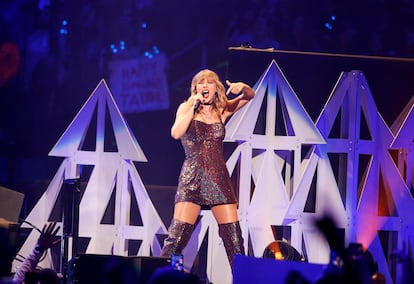

Amid a rise in the illegal resale of tickets, exorbitant and fluctuating prices and scams, buying a concert ticket has become a risky proposition these days. Recently, controversy over the high cost of tickets in a Ticketmaster pre-sale for Taylor Swift’s new tour was so loud that it reached the political realm. In the summer, Bruce Springsteen likewise angered many fans with astronomical ticket prices for his concerts.
Whenever such controversies occur, the question of whether concert tickets are overpriced comes up. And if they are overpriced, why is that the case? Are there enough measures being taken to combat scam ticket websites? Below, we explain the process of pricing and purchasing tickets.
Who decides how much a concert costs?
Ticket prices are linked to an event’s production costs, which the promoter covers. “The promoters are the ones who take on the risk of an event; if the tickets are not sold, they will have to pay the expenses and lose money,” notes Manuel López, the executive director of the Sympathy for the Lawyer music law firm. Joaquín Martínez, the director of the Esmerarte representation agency, points out the current problems concert promoters face; they, too, are experiencing an increase in the cost of living. “Increased expenses have repercussions across the board, in terms of costs and production expenses and, therefore, ticket prices. Even so, a promoter takes on a certain percentage of these costs.”
How much do the performers receive?
The first expense a promoter must establish to determine the price of a concert is the performer’s fee. “It’s normal for a band to have a fixed fee, because if they have to plan a 30-date tour in Europe they have to know what they expect to earn each night to cover their expenses,” explains Barnaby Harrod, the director of Mercury Wheels @ Live Nation, a music promotion company that works with The National, Twenty One Pilots, Camila Cabello and Ed Sheeran. “Although we negotiate with the bands, we understand that they have to charge a certain amount to do a tour,” he adds.
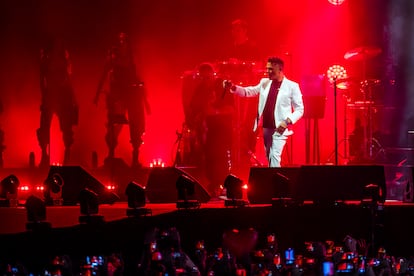
The “great scourge” of unauthorized ticket sales
The professionals we consulted for this article all agree that one of the main problems that the live music industry faces today is the unauthorized sale of tickets. López refers to it as “the great scourge of live music.” According to the lawyer, reselling tickets is “a totally illegal practice that lacks permission [to do so] from the event promoter and/or the artist.” Resale websites or “secondary ticket platforms,” as they refer to themselves, have large investments of money and aggressive positioning strategies on Google, allowing them to make concert tickets available to users at prices that differ from the original costs set by the promoters. Ticket resale websites are shielded from accountability as mere intermediaries, but they have disastrous effects on both the music industry and its consumers.
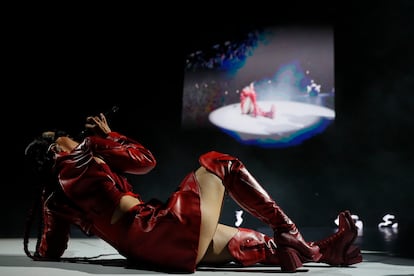
Ticket resale websites often deceive their customers. For instance, Daniela Bosé, the general manager of Madrid’s Palacio Vistalegre concert venue, says that she has had to relocate people who purchased a ticket from an unauthorized vendor, thinking it was VIP seating when in fact it was in the nosebleed section. “And that’s if they are lucky; sometimes a ticket has been sold to five people. I’ve had people come to me with tickets for a seat that was already taken by someone who had bought it through a legitimate channel. It is a constant struggle. Then, when there is a complaint, the user talks about the organization, but who is the organization?” she adds. For his part, Martínez says: “The resale issue damages the code of ethics that the promoter employs to universalize the ability to acquire a ticket; it completely transforms production, and that’s when you consider raising the ticket price.” In fact, his main concern is that unauthorized sales will drive people away from concerts: “Even if you explain to them that these are unauthorized web pages, when scams occur, those affected associate it with the [live music] industry.”
To prevent such abuses, promoters have gone on the counterattack. At Mercury Wheels @ Live Nation, Harrod says, the ticket price does not depend on ticket resale “because that would be crazy; instead, we can sell a limited number of tickets per buyer.” For Ed Sheeran’s concerts at the Metropolitano and Olympic Stadiums in Madrid in 2019, for example, they used nominative tickets, an increasingly common practice that artists are adopting to avoid resale. This ticketing system, though, is complicated because of the logistics: “It involves people showing their ID in a line of 50,000 people at stadium gates.” Yet Harrod asserts that the strategy is effective: “For [the] Sheeran [concert], we made a YouTube video with an influencer who explained the idea of nominative tickets in a minute and a half, and we had very few problems. It worked very well for us.”
Dynamic pricing: Yay or nay?
“Dynamic pricing” is a tactic that could put an end to the illegal sale of tickets. The strategy was recently in the news; Springsteen fans were enraged by the astronomical costs charged for tickets to see the performer on his most recent tour. The algorithm – evil for some, a saving grace for others – was responsible for the prices. It’s a mathematical formula in which the cost of a concert ticket varies (sometimes drastically) according to the specific real-time demand for an event at a particular location.
Opinions about dynamic pricing vary in the live music industry. The Esmerarte director finds it difficult to believe “that commercialism, no matter how much it works and introduces [new] formulas to survive, could make us forget what music is all about.” As to whether there’s a possibility of regulating it to avoid exorbitant prices, he asks: “How do you regulate supply and demand when there can clearly be demand from people who are willing to pay very high prices? I personally would not feel very comfortable [doing that]; we would [be using] constraints that have nothing to do with the essence of music.” As Bosé notes, “I buy airplane tickets online and, depending on the seat I want, the price is higher or lower. If you buy a ticket to go to Madrid’s Teatro Real [Royal Theater], obstructed view seats have one price and the nosebleed section has another one.” In any case, she said, “proposing to regulate prices is unthinkable; it makes no sense when it comes to private sales.”
VIAGOGO: multa en Italia https://t.co/jslK2KtFVy pic.twitter.com/T5YHiVZztt
— Daniela Bosé (@bose_daniela) June 28, 2022
The audience speaks
Partly unaware of dynamic pricing, band fees and the ins and outs of the live music industry, people who purchase tickets for major concerts know only one thing for certain: ticket prices have gone up. Prices have risen so much that what was once an almost automatic purchase has now become a measured transaction that depends on other basic monthly expenses. 37-year-old Laura París, the director of a music school, sums it up: “Before I wasn’t so selective, but I can no longer afford it financially. A concert that cost between €28 and €35 a few years ago now costs me an average of €60.″ She confesses that she went to the Rosalía concert in Madrid last July, which cost €110, mainly because of her partner: “It pained me to spend that money.”
María del Mar López, 33, and Antonio Guirao, 34, who work in the food service industry, say that the ticket prices for a Rosalía concert in Valencia, Spain (€79.50), caught them somewhat off-guard after the pandemic, the birth of a child and a major change in residence. They remember that a 2010 Arctic Monkeys concert at Barcelona’s Sant Jordi Club cost €37.50. They also have their reservations about the dynamic-pricing model: “We would have to see how much the average ticket for a big concert costs.”
Suso Elorza, a 34-year-old who works in project management, wanted to go to Rosalía’s Madrid concert. He had a ticket, but ultimately he had to sell it because he couldn’t attend: “I did it in five minutes on TicketSwap; I sold it at cost, factoring in the commission that the platform charges for management fees.” Of buying tickets online, he says he doesn’t understand the digital queues: “You are waiting for half an hour, and it turns out that all the tickets have been sold, but 10 minutes later you find them on other resale platforms.” He is also perplexed about why management fees are charged per ticket and not per purchase (a purchase can include several tickets).
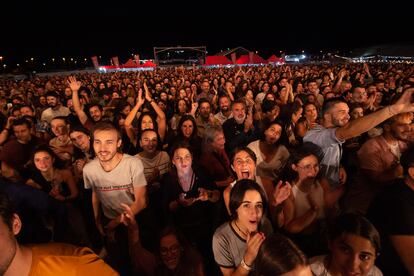
36-year-old digital marketing expert Rocío Gómez’s experience most closely approximates what might be the future of online ticket sales. In a recent attempt to buy tickets for a Blink-182 concert next year, she had to resort to using Ticketmaster’s Platinum service, which only offered €130.50 tickets. In the end, she bought two. Luis Méndez, a sales representative at the Spanish company Enterticket, concedes that he understands that endless digital lines are frustrating but sees little solution to a problem that, he says, is fundamentally a mathematical issue: “If the event has a capacity of 17,000 people and there are six million people trying to get a ticket, obviously 5,987,000 are going to be left without one. Demand far outpaces supply in digital queues.” Méndez notes that tickets do not go to resale websites: “There are people who think that the ticketing company gives tickets to these [resale] pages, but that could not be further from the truth. Ticketing companies and promoters condemn resale. For that reason, we always try to have the promoter manage the ticket sales with nominative data.”
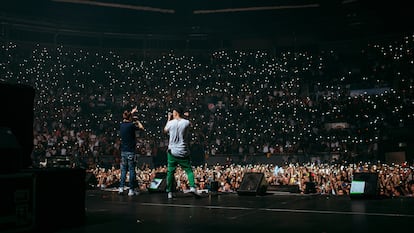
Why do we pay management fees?
Management fees are added to the ticket price, so a ticket that costs €60 is really €66 in total after management fees are applied. Méndez explains that the management fees partially cover the technological and personnel costs of the company managing ticket sales. He says that these fees depend on the promoter and other factors including the performer, venue capacity and how much marketing the event requires: “Promoters decide what the price should be; they are our clients and the ones who risk the capital. “The margins are often very tight, and the promoter believes it is necessary to tax the [ticket] costs to avoid losing [money].”
What happens at medium-sized and small venues?
Fanny Gornes, the organizer of the concert series Sound Isidro and Mazo Madrid, is active on the medium-sized venue circuit. She represents the type of promoter who can risk more than those who try to fill stadiums and arenas. Luckily, she can count on some of the artists she works with to cooperate: “Since the pandemic, many have lowered their fixed rates so they can go back to doing concerts. On the other hand, the price of absolutely everything associated with concert production has gone up. Sometimes, if both the promoter and the performer see days before the concert that it has not sold enough tickets, we [can] come to an agreement to lower the fixed fee and we go back to meeting certain numbers. [That’s with] the house performers we already know; with international artists, you just have to eat the cost.”
On other occasions, she adds, “we reach an agreement to not pay a fixed fee and go by box-office [sales] instead. Or we cover the hall rental and take a little of the box office and the artist gets the rest. It’s playing with variables and numbers.” There’s also some flexibility by genre: “For urban artists, who have a very young audience with tight budgets, you can’t charge a very high ticket price because we risk people not going.”
Sign up for our weekly newsletter to get more English-language news coverage from EL PAÍS USA Edition
Tu suscripción se está usando en otro dispositivo
¿Quieres añadir otro usuario a tu suscripción?
Si continúas leyendo en este dispositivo, no se podrá leer en el otro.
FlechaTu suscripción se está usando en otro dispositivo y solo puedes acceder a EL PAÍS desde un dispositivo a la vez.
Si quieres compartir tu cuenta, cambia tu suscripción a la modalidad Premium, así podrás añadir otro usuario. Cada uno accederá con su propia cuenta de email, lo que os permitirá personalizar vuestra experiencia en EL PAÍS.
¿Tienes una suscripción de empresa? Accede aquí para contratar más cuentas.
En el caso de no saber quién está usando tu cuenta, te recomendamos cambiar tu contraseña aquí.
Si decides continuar compartiendo tu cuenta, este mensaje se mostrará en tu dispositivo y en el de la otra persona que está usando tu cuenta de forma indefinida, afectando a tu experiencia de lectura. Puedes consultar aquí los términos y condiciones de la suscripción digital.








































